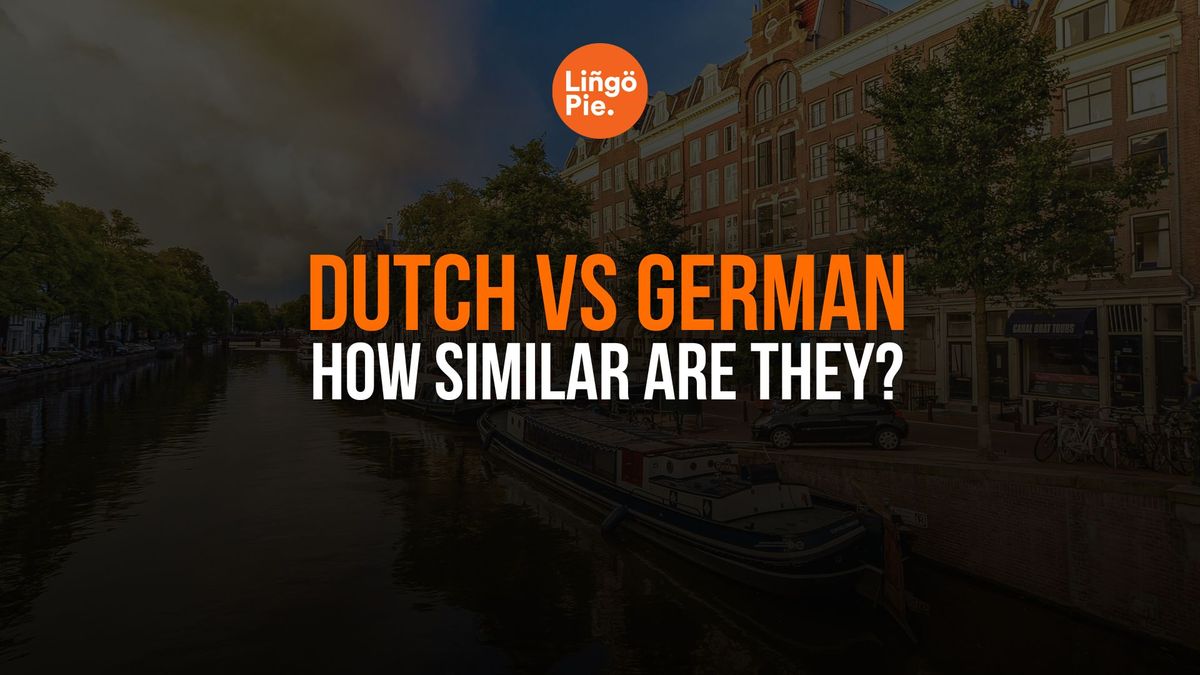Ever wondered why Dutch and German sound so similar, yet so different? Dutch vs German might look like close relatives at first glance, and there's a good reason for that - these languages share ancient roots that go back over a thousand years.
But just how deep do these similarities really go? I mean, I personally know some Dutch speakers can follow German movies and TV shows without subtitles, while others find themselves completely lost.
Take a simple phrase like "ich liebe dich" - a Dutch speaker might recognize it as similar to "ik hou van je," but the pronunciation and structure feel distinctly foreign. This striking difference in comprehension hints at a complex relationship between these languages that's worth exploring more deeply.
So in this post, stick around as I'll explain why these languages can feel both so familiar and so foreign at the same time.
- 56+ Easy Portuguese Greetings For Total Beginners
- 80+ Basic Chinese Phrases You For Travelers
- 20+ Kiwi Slang Words That'll Make You Sound Less Like a Tourist

Dutch Vs German
Dutch might not be as widely known as German, but it's actually the official language of the Netherlands and one of the official languages in Belgium (where it's also called Flemish). Around 20 million people worldwide speak Dutch - most of them in the Netherlands, northern Belgium, and even in Suriname, South America. Pretty impressive for a country smaller than most U.S. states!
German, on the other hand, is Europe's powerhouse language. It's not just Germany's official language - you'll hear it in Austria, Switzerland, Liechtenstein, and parts of Belgium and Luxembourg too. With about 150 million speakers globally and many more learning it, German ranks among the world's most influential languages.
These languages might share ancient roots, but they've each carved out their own unique space in today's world. While Dutch thrives in international trade (thanks, Rotterdam port!) and tech startups, German dominates in business, science, and engineering across Europe. Knowing either language can seriously boost your career prospects, especially if you're interested in working in the EU.
Dutch vs German: By the Numbers
While both languages share Germanic roots, their global reach and influence tell very different stories. Here's how Dutch and German stack up when you look at the hard data:
| Metric | Dutch | German |
|---|---|---|
| Native Speakers | 23-25 million | 90-95 million |
| Second Language Speakers | 4-5 million | 10-25 million |
| Foreign Language Speakers | 5-7 million | 75-100 million |
| Total Global Speakers | 28-30 million | 175-220 million |
| Global Language Rank | 42nd | 11th |
The stark difference in speaker numbers explains why German is considered a global language while Dutch remains regionally significant. German's large foreign language learner base (75-100 million) demonstrates its international importance, while Dutch's smaller learning community (around 500,000 active learners) reflects its more specialized appeal in trade, international business, and academic contexts.
Do Dutch And German Have The Same Roots?
Absolutely - Dutch and German both grew from the same ancient Germanic language family, specifically from a branch called West Germanic. Think of it like a really old family tree, where around 2,000 years ago, these languages started as practically the same tongue. Back then, tribes speaking early forms of these languages lived across what we now call Germany, the Netherlands, and parts of Belgium.
You might spot this shared history in some basic words they both use today. Take "water" for example - it's exactly the same in both languages! Or look at the word for house: "huis" in Dutch and "Haus" in German. Pretty close, right? Even numbers show this connection - "twee" in Dutch and "zwei" in German both mean "two."

What Do Dutch And German Have In Common?
For starters, both languages create new words by combining existing ones (compound words). In German, "Krankenhaus" means hospital, while Dutch uses "ziekenhuis" - both literally translate to "sick house." These patterns appear throughout both languages.
Here's a quick look at some fascinating parallels between these languages:
| Feature | Dutch Example | German Example | English Meaning |
|---|---|---|---|
| Basic Words | water, hand, melk | Wasser, Hand, Milch | water, hand, milk |
| Question Structure | "Waar ga je heen?" | "Wo gehst du hin?" | Where are you going? |
| Articles | de, het | der, die, das | the |
| Compound Words | tandarts | Zahnarzt | dentist |
| Verb Position | "Ik weet dat hij komt" | "Ich weiß dass er kommt" | I know that he's coming |
| Modal Verbs | kunnen, willen | können, wollen | can, want |
Both languages also place their verbs in specific positions - usually the second position in main clauses and the last position in subordinate clauses. They also share a similar approach to forming compound tenses with auxiliary verbs.
Here's what makes them recognizably related: they both maintain the Germanic V2 word order (verb-second rule) in main clauses, use separable verbs, and form compound words following similar rules.

How Are Dutch And German Different?
Here's a major difference right off the bat: German grammar loves its rules and cases (nominative, accusative, dative, and genitive), while modern Dutch keeps things much simpler. In fact, Dutch has done away with most grammatical cases entirely - nouns just have singular and plural forms. While you might spot some old case remnants in fixed expressions (like "de heer des huizes" - master of the house), they're rarely used in everyday Dutch.
Pronunciation sets these languages apart too. Dutch speakers often use sounds that make German speakers do a double-take. The Dutch 'g' sound is famously guttural - much rougher than its German cousin. And while German speakers navigate their 'ü' and 'ö' sounds (German's Umlaute), Dutch sticks to a different set of vowels, including unique diphthongs like 'ui' and 'eu'.
Let's look at some amusing word mix-ups between Dutch and German:
- The Dutch word "slim" means "smart," but the similar-looking German "schlimm" means "bad" or "terrible"
- In Dutch, "vers" means "fresh," while in German, "vers" means "verse" (as in poetry)
- Dutch speakers say "alstublieft" for "please," while Germans keep it short with "bitte"
- The Dutch word "dur" means "dare," but the German "dur" refers to a major musical key
Writing looks different too. German capitalizes all nouns (like Haus, Baum, Buch), while Dutch follows rules more like English, keeping capitals for proper names and the start of sentences. Plus, German spelling often looks more complex - just compare the German word "Schmetterling" (butterfly) with the Dutch "vlinder."

Dutch Vs German: Which Is Easier To Learn?
According to the Foreign Service Institute (FSI), Dutch is officially easier for English speakers to learn than German. The FSI puts Dutch in Category I - the easiest group of languages for English speakers - suggesting it takes about 24-30 weeks to reach basic fluency. German, on the other hand, sits in Category II, typically requiring 36-40 weeks to reach the same level.
Why this difference? While German involves mastering three genders, four cases, and strict verb placement rules, Dutch flows more naturally for English speakers. Take verb conjugation - Dutch keeps it relatively simple with patterns similar to English, while German throws in more irregularities and rule variations. And when it comes to word order, Dutch often feels more intuitive to English speakers, especially in complex sentences.
How to Learn Dutch and German
Learning any language takes dedication, but there are some smart ways to tackle these Germanic languages. Start with basic phrases - get comfortable with everyday expressions before diving into those grammar books. Both languages benefit from what linguists call "immersive learning" - basically, surrounding yourself with the language in real-world contexts.
But if you ask us our most recommended approach, then that would be to watch movies and TV shows in German or Dutch. When you hear native speakers using the language naturally, you pick up on pronunciation, rhythm, and common expressions that textbooks just can't teach. Plus, seeing the language used in context helps your brain make stronger connections.
Speaking of watching content, here's some exciting news: Lingopie already offers an amazing collection of German TV shows and movies that help you learn while being entertained. You can watch authentic German content with interactive subtitles, making it super easy to understand native speakers and pick up new vocabulary.
And if you're interested in learning Dutch - get ready! Lingopie will soon be adding Dutch content to its platform, bringing the same effective learning approach to this accessible language.
- How To Say I Love You In Dutch: 10+ Ways To Express Love
- 18 Surprising Dutch Slang Words And Phrases
- 18+ Crazy Dutch Swear Words And Insults
Ready To Take The German Or Dutch Challenge?
Look, both Dutch and German have their own special charm - one's not better than the other, they're just different paths to becoming bilingual. The cool thing is, with Lingopie's German and Dutch content already up and running, you can start learning whichever language catches your eye through real shows and movies. No textbooks required, just grab some snacks and start streaming.
Why wait? Learn Dutch or German now on Lingopie. Either way, you're about to discover how fun language learning can actually be!
Check out these popular questions about Dutch and German
Is Dutch easier than German for English speakers?
According to the Foreign Service Institute (FSI), Dutch is definitely easier for English speakers to learn. It's a Category I language, taking about 24-30 weeks to reach basic fluency, while German is Category II, requiring 36-40 weeks. The simpler grammar system and closer relationship to English makes Dutch more approachable for English speakers.
Can Dutch speakers understand German?
While Dutch speakers might catch bits and pieces of German conversations, they usually can't understand German fully without studying it. Think of it like seeing a puzzle where some pieces look familiar, but you still can't make out the whole picture. Some Dutch speakers can follow German TV shows thanks to similar vocabulary, but full comprehension requires actual language learning.
Why is German so different from English?
German's complex grammar system sets it apart from English, with its four cases (nominative, accusative, dative, genitive), three grammatical genders, and strict rules about verb placement. English lost many of these features centuries ago, which is why German can feel more challenging for English speakers today.
Which language is more useful: Dutch or German?
German offers broader career opportunities across Europe due to its larger speaker base and Germany's economic influence. However, Dutch can be incredibly valuable in international trade, especially if you're interested in working with Benelux countries or in sectors where the Netherlands excels, like water management, agriculture, or tech startups.
Is Dutch just a mix of English and German?
While Dutch shares features with both English and German, it's very much its own distinct language with unique characteristics. It's more accurate to say these three languages are cousins who grew up differently - they share the same Germanic roots but developed their own unique grammar, pronunciation, and vocabulary over time.
Want to start learning German now or get ready for Dutch? Lingopie's got your back. Start streaming in German today, or join the waitlist for their upcoming Dutch content launch!








![5 Dutch Translation Apps You Need To Install [RANKED]](/blog/content/images/size/w300/2026/01/Best-dutch-translation-apps.png)

![How To Say Happy New Year In Dutch [Plus 10+ Useful Words]](/blog/content/images/size/w300/2025/12/how-to-say-happy-new-year-In-dutch.jpeg)